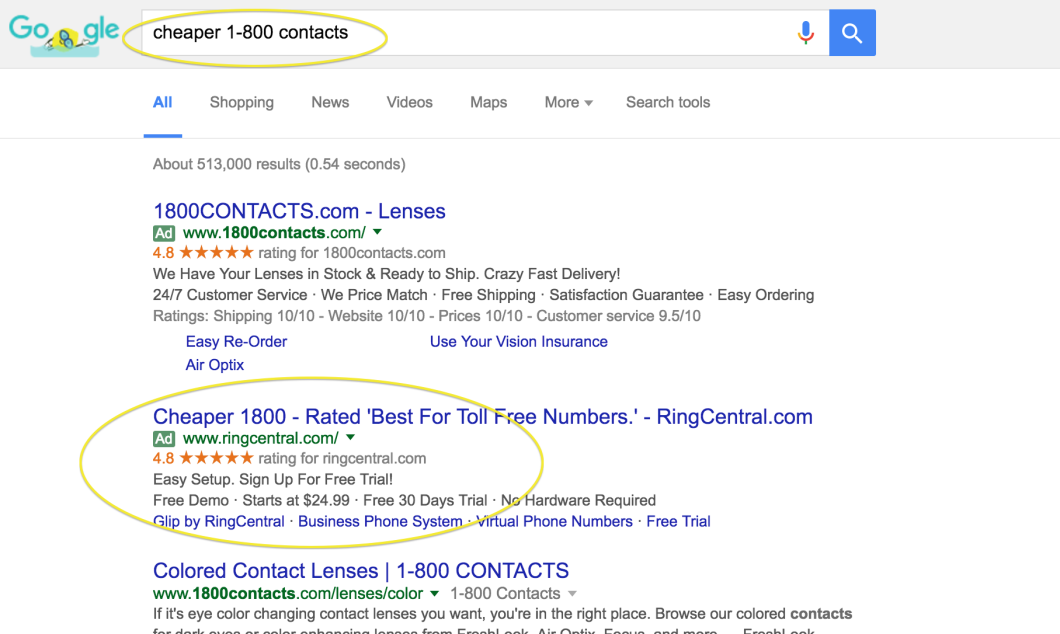Feds Accuse 1-800 Contacts Of Badvertising
The Federal Trade Commission filed a lawsuit today against 1-800 Contacts, accusing the online lens retailer of making agreements with more than a dozen competitors to not compete with each other for online search ads, resulting in lens buyers paying higher prices.
The way that search engine results advertising is supposed to work is that competing businesses in the same industry each bid on relevant search terms, telling Google, Bing, etc. the maximum amount they would be willing to pay to show up as a paid ad at the top of the results.
Each time someone does a search for one of these keywords, a search engine algorithm looks at the bids and picks the most relevant and useful result.
However, according to the FTC complaint [PDF], 1-800 Contacts has been making deals with competitors for more than a decade that prevent these other lens retailers from entering bids that would hurt 1-800 Contacts’ 50% share of the online contacts market.
The FTC says it started back in 2004, when 1-800 Contacts would serve competitors with cease-and-desist notices if their ads came up when search engine users looked for “1-800 Contacts” or some variation of the name.
The company’s argument at the time was that having someone else’s company show up when searching for “1-800 Contacts” was a trademark violation. It’s not, but that didn’t stop 1-800 from threatening legal action.
The FTC says that, between 2004 and 2013, at least 14 competitors entered into agreements with 1-800 Contacts to cease competing for certain keywords. The competing companies said they would not bid on any of the variations or misspellings of 1-800 Contacts, while 1-800 said it would not bid on terms using the competitors’ trademarked names — even though most of them had never raised any sort of trademark claims against 1-800.
Even more problematic, according to the FTC, is the fact that all but one of these bidding agreements includes a condition governing “negative keywords.” That’s the use of things like “not” or other terms intended to find something other than the usual result for the search keywords.
The complaint gives the example of someone searching for “1-800 Contacts cheaper competitors.” Because the 13 competitors were barred from bidding on the negative keywords, only ads for 1-800 Contacts showed up. We tried “Cheaper 1-800 Contacts” and the only non 1-800 Contacts ad was for a toll-free phone service:

“The Bidding Agreements go well beyond prohibiting trademark infringing conduct,” reads the complaint. “They restrain a broad range of truthful, non-misleading, and non-confusing advertising.”
The lawsuit also contends that 1-800 Contacts regularly policed search results for compliance with these bidding agreements and that it would threaten additional dubious legal action if it found competitors’ ads showing up when it believed those listings should not.
In fact, notes the complaint, the one competitor who refused to back down when faced with the questionable trademark claim was Lens.com. 1-800 Contacts eventually filed suit, but in 2013 the Tenth Circuit Court of Appeals rejected the idea that consumers would be sufficiently confused when a Lens.com ad shows up in a search for 1-800 Contacts.
The complaints alleges that, in violation of the FTC Act’s prohibition against unfair restraints on competition, these bidding agreements harm two separate markets.
The online search market is harmed, per the FTC, because this behind-the-scenes gaming of the system prevents search engines from displaying “the array of advertisements that are most responsive to a user’s search.” Likewise, it allegedly impairs the “quality of the service provided to consumers by search engine companies.”
Meanwhile, the FTC contends that contact lens buyers are deprived of “truthful and non-misleading information about the prices, products, and services offered by online sellers of contact lenses,” and the “benefits of vigorous price and service competition” in this market.
[UPDATE: 1-800 Contacts has emailed a lengthy statement to Consumerist. It is included in full at the end of this story]
Interestingly, 1-800 Contacts has been a vocal opponent of price-fixing in the contact lens industry. About three years ago, the nation’s biggest lens makers — Bausch & Lomb, Alcon, and Johnson & Johnson — began requiring price floors from its retail outlets.
That means that 1-800 Contacts and Costco, which had long sold contacts at a discount compared to other retailers and optometrists, can’t sell those companies’ products (which account for around 80% of lenses sold in the U.S.) for any less than the floor dictated by the manufacturers.
Utah — home to 1-800’s corporate office — enacted a law in 2015 outlawing this sort of price fixing in the contact lens market. The lens companies sued the state, with 1-800 and Costco both chiming in as affected parties. Last summer, a federal appeals court allowed the law to go into effect, but the lens makers’ lawsuit is still pending.
1-800 CONTACTS STATEMENT:
The following statement from Cindy Williams, General Counsel for 1-800 Contacts, was emailed to Consumerist:
“1-800 Contacts strongly disagrees with the Federal Trade Commission’s (FTC) contention that agreements designed to protect its trademark hinder competition. 1-800 Contacts is confident in its legal position and will vigorously defend its intellectual property rights in response to the administrative complaint filed today by the FTC.
“1-800 Contacts has a long history of advocating for increased competition and consumer rights, including championing the passage of the landmark Fairness to Contact Lens Consumers Act of 2003 that increased convenience and lowered prices for consumers, and opposing recent price fixing by manufacturers. 1-800 Contacts strongly believes in a competitive contact lens marketplace and will continue to be a leading advocate for providing consumers with more choice, greater convenience and lower prices.”
Want more consumer news? Visit our parent organization, Consumer Reports, for the latest on scams, recalls, and other consumer issues.

